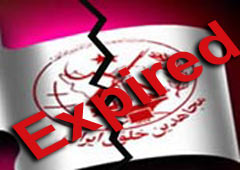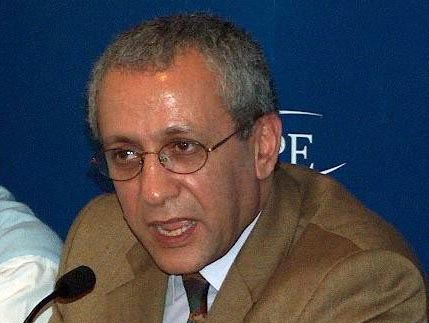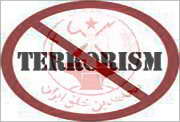Official: Baghdad soon to close MKO file
Iraqi National Security Advisor Muvafaq al-Rubai said here Friday that Iraqi government will in next few months close dossier of the terrorist Mujahideen Khalq Organization (MKO).
“The MKO is a terrorist group and a cancerous tumor in Iraq; The crimes and sins the group has committed are evident and well-documented. Several thousand Iraqi citizens have fallen victims of the terrorist organization and we have provable evidence, that we will submit them to Iraqi courts,” said al-Rubai in an exclusive interview with IRNA.
He said the MKO was stationed in Iraq by former Iraqi ruler Saddam Hussein and contrary to then regulations in Iraq, getting involved in suppression of Iraqi people’s Intifadha in 1991 and massacre of Kurds and Shiites.
He added that after formation of popular government of Iraq, the MKO has taken provocative moves against legal government of the country over recent years.
He went on to say that Iraqi courts have issued arrest warrants for 14 MKO members.
On removal of the MKO from Europe’s list of terrorist organizations, he said the MKO case is complicated and the European courts have thus far removed the outfit from the terrorism list and re-entered them into the list three times.
He said that the MKO will soon be put in the EU terrorist list.
“We have asked the EU to contribute to settlement of problem with the MKO and their exit from Iraq; we have recently discussed the issue with ambassadors of the countries and they have vowed to cooperate.”
IRNA
A former member of the Mojahedin-e Khalq Organisation (MKO), who abandoned the outlawed group in protest at its terrorist operations, said the European Union should take responsibility of supporting the MKO in its terrorist acts.
European Union should take responsibility of supporting the MKO in its terrorist acts.
Masoud Khodabandeh said deproscribing the MKO by the EU is a politically-motivated move which leads to support for the terrorism spread by the MKO.
He told the Islamic republic news agency that Europeans should take the responsibility of future measures by MKO terrorists who are going to be allowed to enter Europian countries.
"You [the Europeans] cannot defend terrorists [by deproscribing the MKO] and at the same time claim you are countering terrorism," he said.
Khodabandeh, who is now the spokesman of a non-governmental organisation dedicated to help members abandoning the MKO, said European leaders have adopted a double-standard policy towards the issue of terrorism.
"The MKO case proves that the European Union behaves in a discriminatory manner," he said, adding that Europeans are well-aware that MKO members have conducted many terrorist operations in the past three decades.
He said the MKO bears "no significance" in international developments as "it has now expired".
Khodabandeh added that MKO members, if released from the Ashraf Camp in Iraq and admitted to European countries, would spread insecurity and terrorism across Europe.
He said the terrorist nature of the MKO has never changed as its members are wearing uniforms and taking military drills in the Ashraf Camp.
He added that Mojahedin-e Khalq Organisation has not only slaughtered many Iranians but also "has been directly engaged in killing Iraqi Shiites and Kurds and suppressing even its own members".
Out of around 3,000 MKO members, he suggested, some 2,000 are in critical health conditions "and are willing to leave the Ashraf Camp."
Khodabandeh said if Europeans do really want to extend their help to these people trapped by the MKO, they should welcome them to Europe–a move he said his organisation will favour.
BERLIN – The notorious MKO terror group will continue to be monitored by Germany’s domestic Verfassungsschutz intelligence agency despite the decision by the European Union to delist the MKO , a German government source told IRNA in Berlin Tuesday. 
Just because the EU has lifted the ban, it does not mean that we don’t have our own national security considerations, the official said, speaking on condition of anonymity.
For instance, parts of the German Left party are being subjected to surveillance by the Verfassungsschutz although they are not blacklisted by the EU, he added.
The official made clear that Germany’s federal secret service and its state branches will continue their observation of the MKO.
Each German state has also its own separate Verfassungsschutz intelligence apparatus.
The MKO has been involved in the mass killings of thousands of innocent Iranians over the past 30 years.
Furthermore, the Israeli-backed MKO terror grouplet has also collaborated with the former Saddam regime, in brutally massacring tens of thousands of Iraq Kurds and Shiites.
Head of MKO terrorist group Maryam Rajavi is expected to remain excluded from the UK despite the EU dropping the previously outlawed group from its proscribed list.
British Foreign Office said that although it does not discuss individual cases of exclusion, the government continues to believe that the MKO or MeK, as it prefers to call it, was ‘responsible for vile acts of terrorism over a long period’.
"If an individual has made public statements in the past supporting or condoning terrorism, and has not publicly and unambiguously apologized and refuted such statements, then this would constitute grounds for not admitting an individual into the UK," Foreign Office spokesman Barry Marston said.
"We are not satisfied that the MeK has done enough to distance itself from its past. There is no dispute about its previous terrorist activity: it claimed responsibility for a large number of violent attacks inside Iran for a number of years," Marston told IRNA.
Rajavi was subject to an exclusion order back in October 1997, which banned her entry to the UK on the grounds that the organization contained a large faction of terrorists. The Foreign Office at the time said her presence was ‘not conducive to the public good’.
The British government insists that the deproscription of the MKO was ‘a judicial and not a political decision’ both in the EU as it was earlier in the UK and that it opposed its removal.
"We have made it clear that we were disappointed by the verdict of the Proscribed Organizations Appeal Commission and of the Court of Appeal, but we had to comply with their decisions," Marston said about the British decision last July.
"Equally, given the clear judgement of the Court of First Instance on December 4, 2008, annulling the MeK’s listing in the EU, the EU had no choice but to observe and respect the court’s judgement," he added.
Asked whether the UK government still considered the MKO as a terrorist organization, he said that there were still ‘serious reservations about the MeK’s assertion that it represents a democratic opposition in exile’.
"We see no evidence of popular support for the MeK in Iran, because of its responsibility for terrorist attacks which resulted in the deaths of many Iranian citizens, and because it fought alongside Iraqi forces against Iran during the Iran-Iraq war," Marston said.
Regarding the potential that the controversial decision could have an adverse effect on Iran’s relations with the UK and the EU as a whole, he stressed that it should ‘not be seen as a political decision’.
"We would not hesitate to re-proscribe the MeK if circumstances changed and evidence emerged that it was concerned in terrorism," the spokesman said.
He also quoted Home Office Minister Tony McNulty insisting last June during the debate on the deproscription of the MKO that the UK government have ‘no plans to meet its representatives’.
Iraq has decided to shut down the terrorist Mojahedin Khalq Organization (MKO) Ashraf Camp as soon as possible, expel the MKO members from Iraq and close their file forever, said a senior Iraqi official.
Political advisor of the Supreme Council for the Islamic Revolution in Iraq (SCIRI), Muhsin Al-Hakim exclusively told IRNA that Baghdad considered the MKO as a terrorist group.
Most of its members are based in Ashraf Camp north of Baghdad.
According to Al-Hakim, continued presence of the terrorist group in Iraq would be against Paragraph 33 of the Resolution 687 of the United Nations Security Council.
It would also be against the Iraqi Constitution, decisions made by the country’s presidency council and approvals of the Iraqi parliament, added the advisor.
The Paragraph 33 of the UN Security Council resolution, approved in April 3, 1991, required the government of Iraq to expel all terrorist groups that are present in the country.
The MKO members have two options of either returning home or leaving for another country but they cannot remain in Iraq any longer, Al-Hakim said stressing that the terrorist group was legally in an unclear situation as its members are neither considered refugees nor prisoners of war.
According to reports by human rights advocates, former members of MKO who returned home were living in good conditions, Al-Hakim added.
The advisor stressed that the grouplet has been barred from conducting all political, social and media activities on Iraqi territory.
He added that an Iraqi battalion was currently in charge of providing external security of Ashraf Camp while its internal affairs are undertaken by the foreign nationals department of the Iraqi Foreign Ministry.
MKO is known as a terrorist group for conducting violent operations in Iran.
It is labeled a terrorist organisation by the United States, the European Union and many other countries.
Many of the MKO members abandoned the terrorist organisation while most of those still remaining in the camp are said to be willing to quit but are under pressure and torture not to do so.
UK wants”partnership”not”conflict”with Iran, says minister
The British government is insistent that it wants to improve relations with Iran  but remains adamant in continuing with its sticks-and-carrots approach in the dispute provoked over the country’s civilian nuclear programme.
but remains adamant in continuing with its sticks-and-carrots approach in the dispute provoked over the country’s civilian nuclear programme.
“First I would like to make very clear we haven’t got any hostility towards Iran. Iran is a country with a long and distinguished history, a magnificent culture,”Foreign Office Minister Bill Rammell said.
“It is a country we want a strong and cooperative relationship with. We very much want a modern relationship as well one based on partnership not on conflict,”Rammell said.
But setting out Britain’s position in an interview with IRNA, he said that this could not be achieved at the moment because of”serious and legitimate concerns.”
These included not only the dispute over Iran’s nuclear programme but accusations of alleged support for terrorism and the promotion of instability in the region.
The minister, who was recently appointed for the Middle East, cited such claims that Iran was supporting the Taliban in Afghanistan, despite it warning the West about its dangers many years before its overthrow in 2001.
He denied that Britain itself was supporting terrorism by recently deproscribing the Mojahedin Khalq Organisation (MKO), which has been responsible for killing tens of thousands of Iranians, insisting it was a court decision opposed by his government.
When challenged, Rammell was unable to name any other terrorist group that was not outlawed by Britain, but said he wanted to make clear that his government still recognized the MKO’s”long-track record”of involvement in terrorism in Iran and the region.
On Thursday, former UK ambassador to Tehran Sir Richard Dalton suggested a new approach was needed to resolve the dispute over Iran’s nuclear programme after five years of deadlock.
A new report on Iran: Breaking the Nuclear Deadlock, edited by Dalton, recommended that Washington engages with Iran and that US president-elect Barack Obama appoints a special envoy as part of a plan to normalize relations with Tehran.
But Rammell remained adamant that Britain was sticking with its current strategy ahead of Obama coming to power, saying the 5 plus 1 had made a”very substantial offer”of incentives to Iran, which had the choice to take it or face the prospect of”tougher”sanctions.
“We don’t want be in position of being at loggerheads with Iran,”the minister told IRNA.
“We want progressive and forward-looking relations.”
But at the root of the deadlock preventing negotiations remains the demand made on Iran to suspend the enrichment of uranium, which it is entitled to do under the Non-Proliferation Treaty.
Recent calls to drop the precondition to talks have been made among others by former American National Security Adviser Zbigniew Brzezinski and for EU External Affairs Commissioner Chris Patten, but this was rejected by the British Foreign Office Minister.
He argued that the package offer was”very reasonable”and that he remained hopeful Iran would accept it.
At the same time, he threatened that pressure would be stepped up for Iran to”make the right choice.”
But when challenged, Rammell refused to say that the real intentions of the US and UK to deny Iran its right to enrich uranium by wanting to make the suspension permanent.
“We want Iran to suspend and engage,”he said without mentioning any time limit. If Iran does, it can meet its concerns for access to civilian nuclear power through the offer made, he suggested.
Ex-MKO members: US impeding efforts to shut Ashraf Camp
London – Several former members of the outlawed terrorist Mojahedin Khalq Organization (MKO) have accused the United States of hampering efforts to close the notorious Ashraf Camp in Iraq.
Arash Sameti, Director of Nejat Association’s Foreign Relations Department, told IRNA that Americans do not want the case of Ashraf Camp closed by refusing to cede it to Iraqi officials.
"The doors of the Ashraf Camp should be opened to international organisations and human rights entities to help those who want to leave the camp to save from the critical situation there," he said.
Sameti added that the Nejat Association, a non-governmental organisation trying to save people from the Ashraf Camp, welcomes the position of the Iraqi government on closing down the camp.
"We want western countries to support the Iraqi government and we express readiness to shelter those trapped in Ashraf Camp," he said, adding that many of Ashraf Camp residents are ill and under constant torture by MKO terrorists not to abandon the ill-famed militant group.
MKO, a dissident group which conducts violent operations against Iran, is labeled a terrorist organisation by the United States and the European Union as well as many other countries including Iraq.
Most members of the outlawed group are based in Ashraf Camp north of Baghdad. Sameti and several other former MKO members abandoned the terrorist organisation because of its coercive actions across the world and founded the Nejat Association -translated as save association- in 2003 to help save others who also want to quit MKO.
Most of the Ashraf Camp residents are said to be willing to quit but are under pressure and torture not to do so.
Sameti and other members of the Nejat Association are in London to lobby for their release. They have met members of the British House of Commons, government officials and human rights activists to raise their awareness about the misery in Ashraf Camp.
Babak Amin, the Secretary of Nejat Association, told IRNA they have also met senior officials of the International Committee of the Red Cross and the United Nations High Commissioner for Refugees.
"Many MKO members in the Ashraf Camp do not want to be terrorists and it’s our duty to save them," he said.
Amin suggested that a flag be hoisted outside the Ashraf Camp so that those who want to put aside their "terrorist uniform" could take refuge under the flag.
"The non-political Nejat Association is ready to host them and even move them to Europe," he said.
Mottaki made the remark at an open session of Majlis in response to a question by Majlis deputy from Semnan Mostafa Kavakebian about reaction of the Iranian Foreign Ministry to anti-Iran statements made by 12 Jordanian MPs…
He stated that hours after being informed of the Jordanian MPs’ statement, Foreign Ministry summoned the Jordanian ambassador to Iran to inform him of Tehran’s strong protest and demands for explanations on the part of the Jordanian government.
Foreign Ministry summoned the Jordanian ambassador to Iran to inform him of Tehran’s strong protest and demands for explanations on the part of the Jordanian government.
He noted that Iran’s envoy to Jordan was invited to the Jordanian Foreign Ministry to be informed that the Amman government considered the MKO as a terrorist group and did not support it.
The Jordanian Foreign Ministry also announced that Jordanian MPs’ move was personal and is not confirmed by the government of Jordan, added Mottaki.
"The Jordanian parliament speaker announced that Jordan does not confirm such a move," said Mottaki.
Mottaki said that as a result of Iran’s reaction, independent Jordanian dailies called the move "wrong".
He added that the Jordanian foreign minister, who had travelled to Tehran to attend a meeting of the Non-Aligned Movement (NAM), announced "We under no conditions officially recognize the grouplet." On the MKO presence in Iraq, Mottaki said, "Americans and Saddam regime provided the MKO with a safe haven and necessary facilities.
Now following the fall of Saddam regime, we should take new initiatives for expulsion of MKO members from Iraq."
He referred to his meeting with Iraqi Foreign Minister Hoshyar Zebari in Tehran on the sidelines of the NAM meeting, where the Iraqi official announced that Baghdad had reached final agreement with Americans to take over the control of Ashraf camp from multinational forces.
He hoped that the decision by the Iraqi government will soon be enforced.
Iran has expressed formal protest to Italy for its support for the terrorist Mojahedin Khalq Organization (MKO), Foreign Ministry spokesman, Hassan Qashqavi, said on Monday.
Qashqavi made the remarks commenting on Rome’s recent decision to unfreeze the terrorist group’s assets.
MKO is recognized as a terrorist group for many cases of bombings, killings and attacks against civilians and government officials.
The group is also well known for collaboration with Iraqi dictator Saddam Hossein to suppress the Iraqi Kurds.
"We have expressed our protest through diplomatic channels to say that the sectarian and terrorist nature of MKO has not changed," he said in his weekly press conference.
Noting that MKO was responsible for killing of 12,000 innocent Iranian, Kurd and Iraqi Shiite people, Qashqavi said the group is still in the list of terrorist organizations for its crimes.
"The Western intelligence agencies have massive information about MKO’s crimes and cannot claim that it has gone through any change," the spokesman added.
Iraqi envoy: Iraq never signs deal with US, unless its interests are met
Iraqi Ambassador to Tehran Abu Heidar al-Sheikh said on Saturday that Iraq would not sign any deal with US, unless it will meet interests of the Iraqi nation and those of all neighboring states. ![]()
In an exclusive interview with IRNA, he said there are lots of unresolved issues on a security pact between Iraq and the US which should be reviewed and that signing a deal at this juncture is out of question.
Any agreement should get approval of the Iraqi parliament, he underlined.
Iraqi religious leaders should also put seal of approval prior to signing any security pact with the US, he pointed out.
The Iraqi nation has the final say in all affairs and its consent is required, he said.
White House officials have declared that if Iraq refuses to sign the security pact with the US, they will freeze Iraq’s assets, he said.
Iraq has asked Iran and the US to attend the fourth round of talks on Iraq’s security, he said, adding that "We are waiting to hear comments from both sides."
…
He called for promotion of jointly run projects as well as investment of Iranian companies in Iraq to help reconstruct the war-shattered country.
Denouncing bloody war between Iran and Iraq, he said the war between the two countries was masterminded by Saddam Hussein and his oppressive regime and the Iraqi nation had no role in it.
On presence of MKO members in Iraq, he said "We believe that they are against the Iraqi and Iranian nations and should leave the country. Their presence in Iraq is totally illegal."
